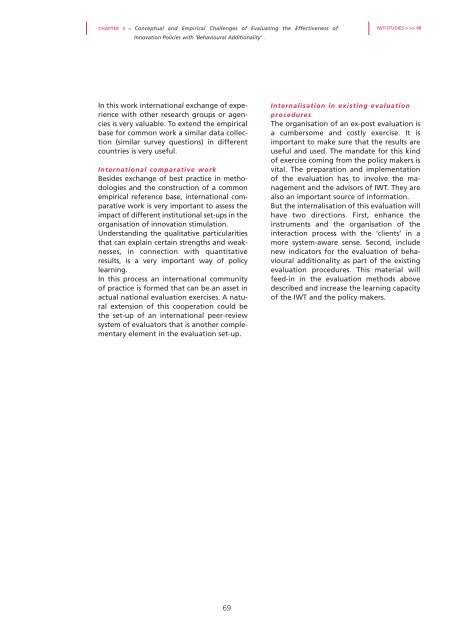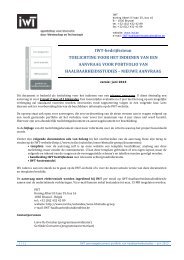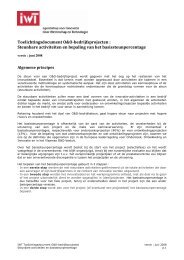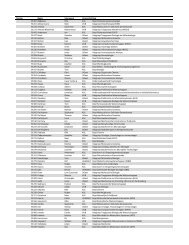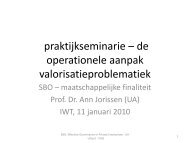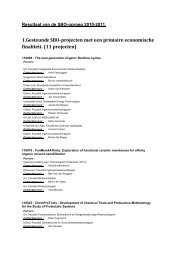The Evaluation of 'Behavioural Additionality' - IWT
The Evaluation of 'Behavioural Additionality' - IWT
The Evaluation of 'Behavioural Additionality' - IWT
Create successful ePaper yourself
Turn your PDF publications into a flip-book with our unique Google optimized e-Paper software.
CHAPTER 3 > Conceptual and Empirical Challenges <strong>of</strong> Evaluating the Effectiveness <strong>of</strong><br />
Innovation Policies with ‘Behavioural Additionality’ .<br />
<strong>IWT</strong>-STUDIES > >> 48<br />
In this work international exchange <strong>of</strong> experience<br />
with other research groups or agencies<br />
is very valuable. To extend the empirical<br />
base for common work a similar data collection<br />
(similar survey questions) in different<br />
countries is very useful.<br />
International comparative work<br />
Besides exchange <strong>of</strong> best practice in methodologies<br />
and the construction <strong>of</strong> a common<br />
empirical reference base, international comparative<br />
work is very important to assess the<br />
impact <strong>of</strong> different institutional set-ups in the<br />
organisation <strong>of</strong> innovation stimulation.<br />
Understanding the qualitative particularities<br />
that can explain certain strengths and weaknesses,<br />
in connection with quantitative<br />
results, is a very important way <strong>of</strong> policy<br />
learning.<br />
In this process an international community<br />
<strong>of</strong> practice is formed that can be an asset in<br />
actual national evaluation exercises. A natural<br />
extension <strong>of</strong> this cooperation could be<br />
the set-up <strong>of</strong> an international peer-review<br />
system <strong>of</strong> evaluators that is another complementary<br />
element in the evaluation set-up.<br />
Internalisation in existing evaluation<br />
procedures<br />
<strong>The</strong> organisation <strong>of</strong> an ex-post evaluation is<br />
a cumbersome and costly exercise. It is<br />
important to make sure that the results are<br />
useful and used. <strong>The</strong> mandate for this kind<br />
<strong>of</strong> exercise coming from the policy makers is<br />
vital. <strong>The</strong> preparation and implementation<br />
<strong>of</strong> the evaluation has to involve the management<br />
and the advisors <strong>of</strong> <strong>IWT</strong>. <strong>The</strong>y are<br />
also an important source <strong>of</strong> information.<br />
But the internalisation <strong>of</strong> this evaluation will<br />
have two directions. First, enhance the<br />
instruments and the organisation <strong>of</strong> the<br />
interaction process with the ‘clients’ in a<br />
more system-aware sense. Second, include<br />
new indicators for the evaluation <strong>of</strong> behavioural<br />
additionality as part <strong>of</strong> the existing<br />
evaluation procedures. This material will<br />
feed-in in the evaluation methods above<br />
described and increase the learning capacity<br />
<strong>of</strong> the <strong>IWT</strong> and the policy makers.<br />
69


